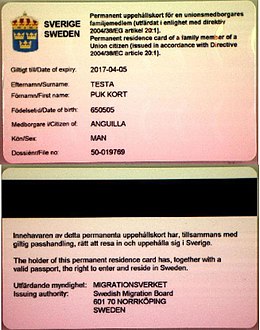Permanent residence card
Permanent residence card ( English permanent residence card , Spanish tarjeta de residencia permanent , Italian Carta di soggiorno permanent , French carte de séjour permanent , Dutch verblijfskaart Duurzame ) is called the residence document in the European Economic Area for the family members of entitled to free movement shall be issued EEA national who does not the citizenship of an EEA country, but a third -country nationality , and who proves the eligibility for permanent residence in this member state.
purpose
The permanent residence card is based on the solidarity of residence of the non-EEA citizen after long-term residence with an EEA citizen in a country of which the EEA citizen does not have citizenship. Because of the general objective → purpose of the residence card .
Legal character
According to Art. 25 Union Citizens' Directive, the exercise of a right or the completion of administrative formalities may under no circumstances be made dependent on possession of a certificate confirming the application for a residence card for family members, a residence card or a permanent residence card if the right can be proven by other evidence. This results in the declaratory nature of the permanent residence card. The permanent residence card does not grant the right of permanent residence, but only certifies it. The permanent residence card thus has a mere identity card character.
Legal basis and scope
The legal basis of the residence card are Articles 16 to 20 of Directive 2004/38 / EC (Union Citizens' Directive) . The directive applies throughout the European Union including Great Britain and Ireland and in the rest of the EEA , including Iceland , Norway and Liechtenstein . It is not valid in Switzerland . The Directive is not directly applicable in the Member States; In terms of content, however, it is to be transferred by the member states into the respective national legislation.
requirements
The general requirements correspond to those of the residence card .
A permanent residence card is issued after five years of uninterrupted legal residence together with the EEA citizen (Art. 16 (2) Union Citizens' Directive). The continuity of the stay is not guaranteed by temporary absences of up to a total of six months a year, nor by longer absences due to the fulfillment of military duties, nor by a single absence of a maximum of twelve consecutive months for important reasons such as pregnancy and childbirth , serious illness , Studies or vocational training or professional posting to another member state or a third country affects (Art 16 para. 3 Union Citizens' Directive).
If the EEA citizen acquires the right of permanent residence earlier, the family member acquires the right to a permanent residence card at the same time (Art. 17 (3) Union Citizens' Directive). However, if the employee or self-employed person dies in the course of his working life before he has acquired a right of permanent residence in the host Member State, his family members who have resided with him in the host Member State acquire the right to stay there permanently, provided that
- the employee or self-employed person has resided in the territory of that Member State without interruption for two years at the time of his death, or
- death occurred as a result of an accident at work or an occupational disease , or
- his surviving spouse lost the nationality of this Member State through marriage to the employee or the self-employed (Art. 17 (4) Union Citizens' Directive).
If the EEA citizen has moved away in the first five years of residence, has divorced the family member, or if the civil partnership has ended, or if the EEA citizen has died, the family member acquires the right of permanent residence if they have been legally uninterrupted for five years has resided in the host Member State (Art. 18 Union Citizens' Directive).
Procedure
Permanent residence cards must be issued within six months of submitting a corresponding application. The permanent residence card can be automatically renewed every ten years. The application for a permanent residence card must be submitted before the residence card expires. Failure to comply with the obligation to apply for a permanent residence card can be punished with proportionate and non-discriminatory sanctions. Interruptions of stay of up to two consecutive years do not affect the validity of the permanent residence card (Art. 20 Union Citizens' Directive).
Loss of permanent residence
If the right of permanent residence has been acquired, only absence from the host Member State for more than two consecutive years leads to its loss (Art. 16 (4) Union Citizens' Directive).
The right of permanent residence may also be restricted by official decision for reasons of public order , security or health (Art. 27 (1) Union Citizens' Directive). In the case of measures for reasons of public order or security, the principle of proportionality must be observed and only the personal behavior of the person concerned may be decisive. Criminal convictions alone cannot justify these measures. Personal conduct must present an actual, present and significant danger that affects a fundamental interest of society. Explanations that are detached from the individual case or referring to general prevention are not permitted (Art. 27 (2) Union Citizens' Directive).
Only diseases with epidemic potential within the meaning of the relevant legal instruments of the World Health Organization and other communicable diseases caused by infectious agents or parasites are deemed to be diseases that justify a loss determination , provided that measures are taken against these diseases to protect the nationals of the host Member State (Art. 29 Paragraph 1 Union Citizens' Directive). Illnesses that occur after a period of three months from the date of entry do not constitute a reason for loss (Art. 29 (2) Union Citizens' Directive).
Implementation in Germany
Web links
- Directive 2004/38 / EC (Union Citizens' Directive) in the consolidated version of June 16, 2011 , accessed on January 13, 2013.



